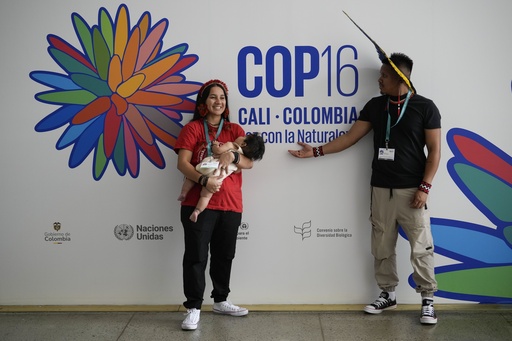
CALI, Colombia — During the ongoing United Nations biodiversity summit taking place in Colombia, negotiators are facing challenges in reaching consensus on several vital topics. Among the critical issues are the financial strategies for protecting 30% of the world’s flora and fauna by the year 2030, the creation of a permanent body representing Indigenous peoples, and the compensation for the genetic data of nature that is utilized in developing commercial products.
The two-week conference, designated as COP16, was originally expected to conclude on Friday, but observers anticipate that discussions may extend into the weekend. The previous summit in Montreal, COP15, set the groundwork for a strategy for countries to preserve deteriorating global ecosystems, while this year’s COP16 aims to implement these plans.
“While COP15 was centered on the ‘what,’ this summit was intended to focus on the ‘how’,” stated Georgina Chandler, who leads policy and campaigns at The Zoological Society of London. In the 2022 Montreal summit, wealthier nations committed to generating $20 billion annually for conservation in developing countries by 2025, with plans to increase this to $30 billion each year by 2030.
Chandler expressed concerns that government representatives have not shown the increased commitments necessary to achieve the $20 billion target, asserting that the current efforts seem inadequate. The absence of substantial financial pledges from affluent nations led 20 ministers from the Global South to issue a united statement emphasizing the importance of building trust among countries and urging the Global North to fulfill its financial commitments.
In the lead-up to these negotiations, over 230 businesses and financial institutions have voiced the need for stronger policies to address the escalating risks of biodiversity loss. Eva Zabey, the CEO of Business for Nature, noted significant delays in negotiations over essential topics, which include mobilizing effective financial resources and ensuring that the benefits derived from nature are acknowledged and equitably distributed.
Zabey emphasized the urgency for governments to overcome their differences and demonstrate serious, decisive leadership to produce a robust outcome at COP16, which could incentivize businesses to take the necessary steps to halt and reverse biodiversity loss by 2030.
A major point of contention at the summit has been the ownership of nature’s DNA. Tensions arose between less developed and affluent nations concerning digital sequence information on genetic resources (DSI), which entails sharing benefits derived from genetic materials used in biotechnology. At COP15, countries agreed to establish a global fund for this purpose.
Oscar Soria, director of The Common Initiative, remarked that the DSI fund was supposed to be finalized at this summit two years ago, yet clarity on how funds would be sourced from companies remains elusive. Reports indicate ongoing disputes over the phrasing within draft agreements among countries, highlighting the complexity of negotiations.
Catherine Weller, Director of Global Policy at the charity Fauna & Flora, remarked on the pressing nature of several unresolved issues as the COP16 discussions approach their conclusion. A key controversy involved some nations resisting the establishment of a Permanent Subsidiary Body to represent Indigenous Peoples and local communities, whose perspectives are considered crucial to many discussions.
“We strongly encourage negotiators to enhance their efforts and ensure this initiative is finalized,” Weller stated.
